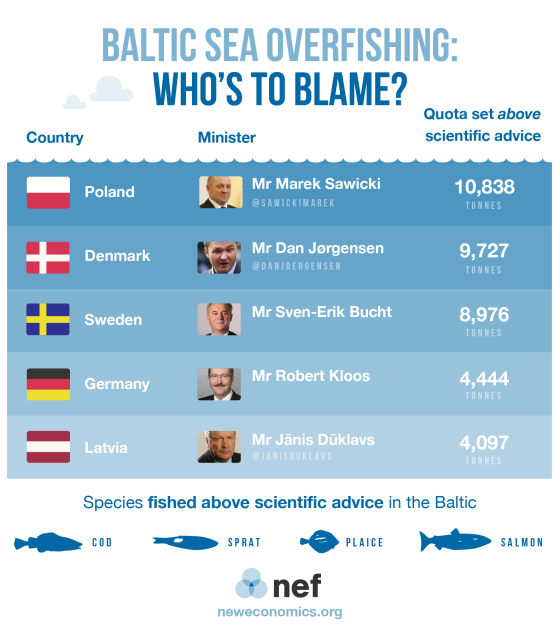A new briefing series by the new economics forum identifies which countries and ministers who stand in the way for moving towards more fish, profits and jobs for European citizens. The first briefing in the series explores the countries and ministers around the Baltic Sea.
To end overfishing and restore fish stocks to healthy levels it is essential to follow scientific advice when setting fishing quotas. It is sadly no news that those in power are not giving this advice the attention it deserves. With this in mind the New Economics Forum, NEF, will in this new briefing series analyse the outcomes of Fisheries Council meetings where Fisheries ministers, based on information from ICES about the state of the stock and recommended maximum catch levels, agree how much fish should be caught in EU waters.
The negotiations and agreements on fishing quotas between ministers at the Fisheries councils take place behind closed doors, only the outcome is public. Based on this lack of transparency of identifying ministers who ignore scientific advice to prioritise short-term interests risking the health of fish stocks for future generations, nef have produced this series of briefings. The series will reveal the member states and ministers that have gone against scientific advice and ended up with higher share of stocks fished above scientific advice. Assuming that these countries are the main drivers of overfishing either by i) actively pushing for fishing limits set above scientific advice or ii) failing to prevent fishing limits above scientific advice.
Baltic Sea overfishing league
First out in this series is the Baltic Sea, where ministers during the October meeting agreed fishing quotas for ten Baltic Sea fish stocks. Of these, five were set above scientific recommendations: salmon, plaice, sprat and two different cod stocks in two different fishing zones. The analysis by NEF shows Poland, Denmark and Sweden as the top three in ranking of overfishing nations in the Baltic Sea. The reason, they have the highest share of stocks that will be fished above scientific advice.
NEF notes that Sweden have been, despite coming third in the table mainly due to large shares in stocks with quotas set above scientific advice, one of the more active states in pushing for alignment between fishing limits and scientific advice.

Please see the pdf attached for more detailed information about the analysis and the ranking of Baltic Sea countries.
NEF plan to release their next briefing in the series after the November and the December Fisheries Councils where fisheries ministers will meet to agree fishing limits for the majority of commercial fish stocks in European waters. FISH appreciate this new angle of showing members states role in setting quotas, but are worried that the approach used by NEF might be too simple, not fully portraying the discussions taking place behind closed doors.